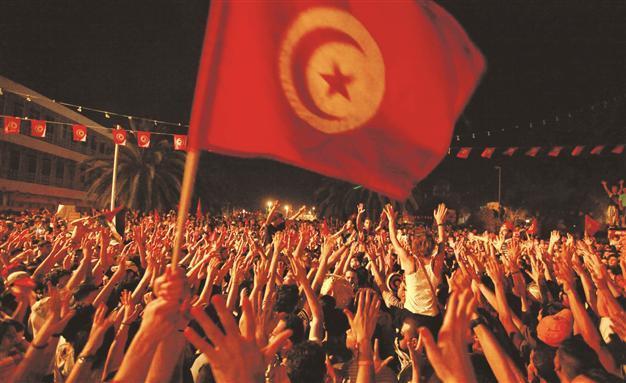Assassinations aim to block Tunisia’s ‘democracy path’
LONDON / TUNIS

People gather outside the Constituent Assembly to demand the ouster of the Islamist-dominated gov’t. Tensions spiraled in Tunisia since the murder of Brahmi.REUTERS photo
The aim of the political assassinations is to block the path to democracy, Tunisia’s ruling Ennahda Party leader Rached Ghannouchi has said, as tensions rose over opposition efforts to oust the Islamist-led government.
Pro- and anti-government demonstrators clashed in two Tunisian cities yesterday as angry opposition protesters tried to storm municipal offices in Sidi Bouzid and stop employees there from working, residents said, sparking clashes between them and supporters of the Islamist Ennahda Party, which leads the transitional government. The army intervened to protect the offices and police fired tear gas. Anti-government protests also erupted in Tunis, with demonstrators demanding the resignation of the government and the dissolution of Parliament.
Tensions have spiraled in the country since the murder of opposition lawmaker Mohamed Brahmi last week. Brahmi was the second opposition politician killed after Chokri Belaid was gunned down outside his home in February and many Tunisians blame the government for both killings.
Opposition may set up salvation government
The Ennahda leader claimed that the assassinations were aiming to achieve the same outcome as that seen in Egypt, stressing that the forces that did not want Tunisian and Arab people to have democracy, modernity and freedoms were behind the killings.
“The ones who organized these assassinations are uncomfortable with the connection of Islam and democracy and always want to see Islam associated with terrorism,” Ghannouchi told Cihan news agency. He denounced the assassination as an attack on democracy after the killing.
The Tunisian leader also threw support to Egyptian people who struggle for democracy. “These are crimes against humanity against people who struggle for their freedoms. The ones who have conscience should react to this savagery,” he said.
Tunisians fear they may be plunging into one of the worst crises in their political transition since Ben Ali was forced to flee by an uprising that inspired unrest across the Arab world. Opposition leaders have said they might set up a rival “salvation government,” an idea they were expected to discuss later yesterday. The secular opposition, emboldened by the Egyptian army’s ousting of an Islamist president this month, is now rejecting all concessions and reconciliation efforts by the government.
The unrest has erupted just weeks before the transitional Constituent Assembly was set to complete a draft of a new constitution. The opposition now demands that the 217-member body be dissolved.
Seventy lawmakers have left it and set up a sit-in outside the Assembly offices in Bardo square.
Authorities have accused radical Salafis close to al-Qaeda-linked group Ansar al-Sharia of gunning down Brahmi, whose body was riddled with 14 bullets outside his home. They say the same gun was used to assassinate Belaid in February. Ansar al-Sharia denied any responsibility.
